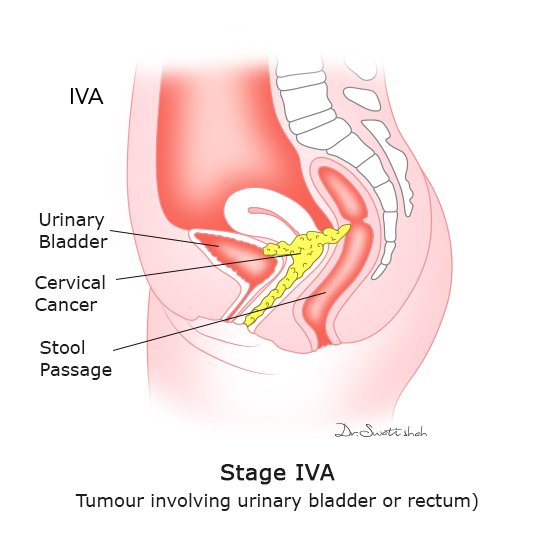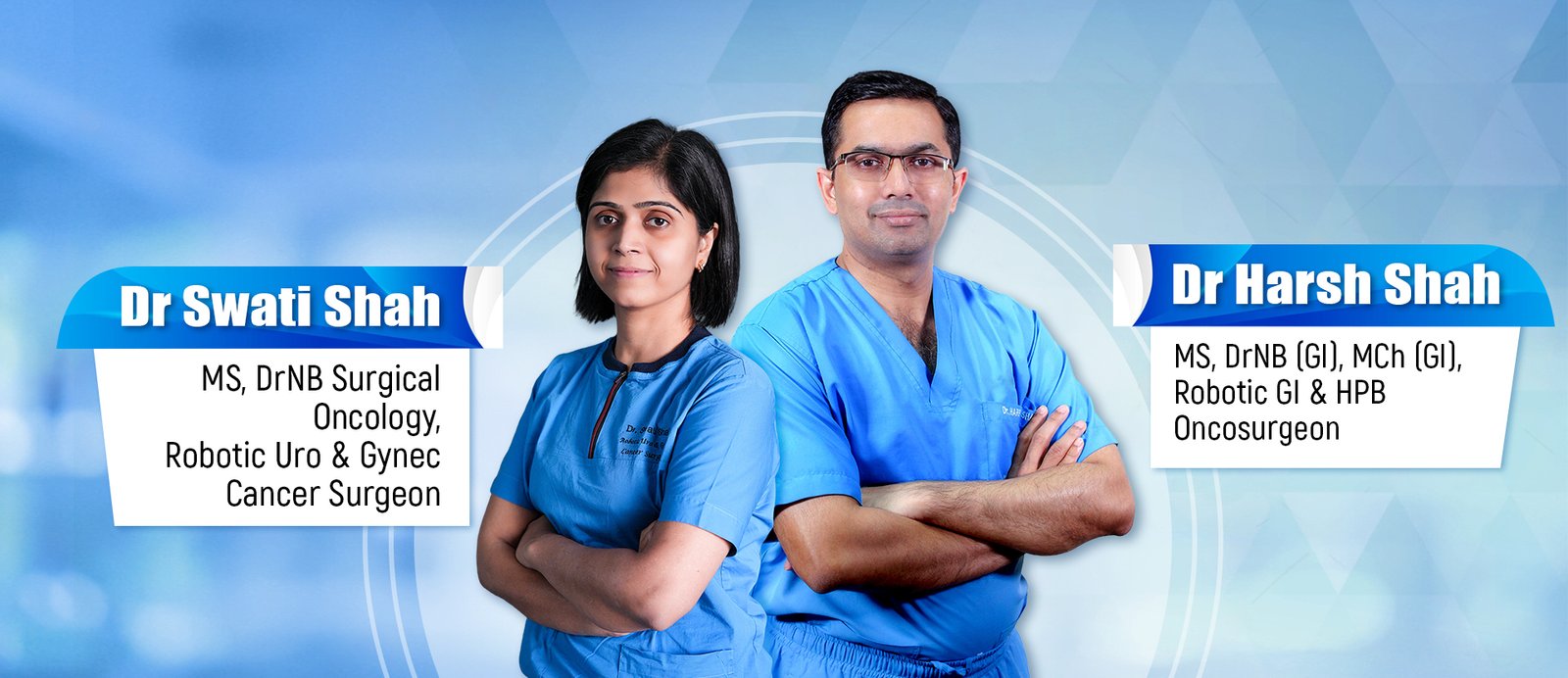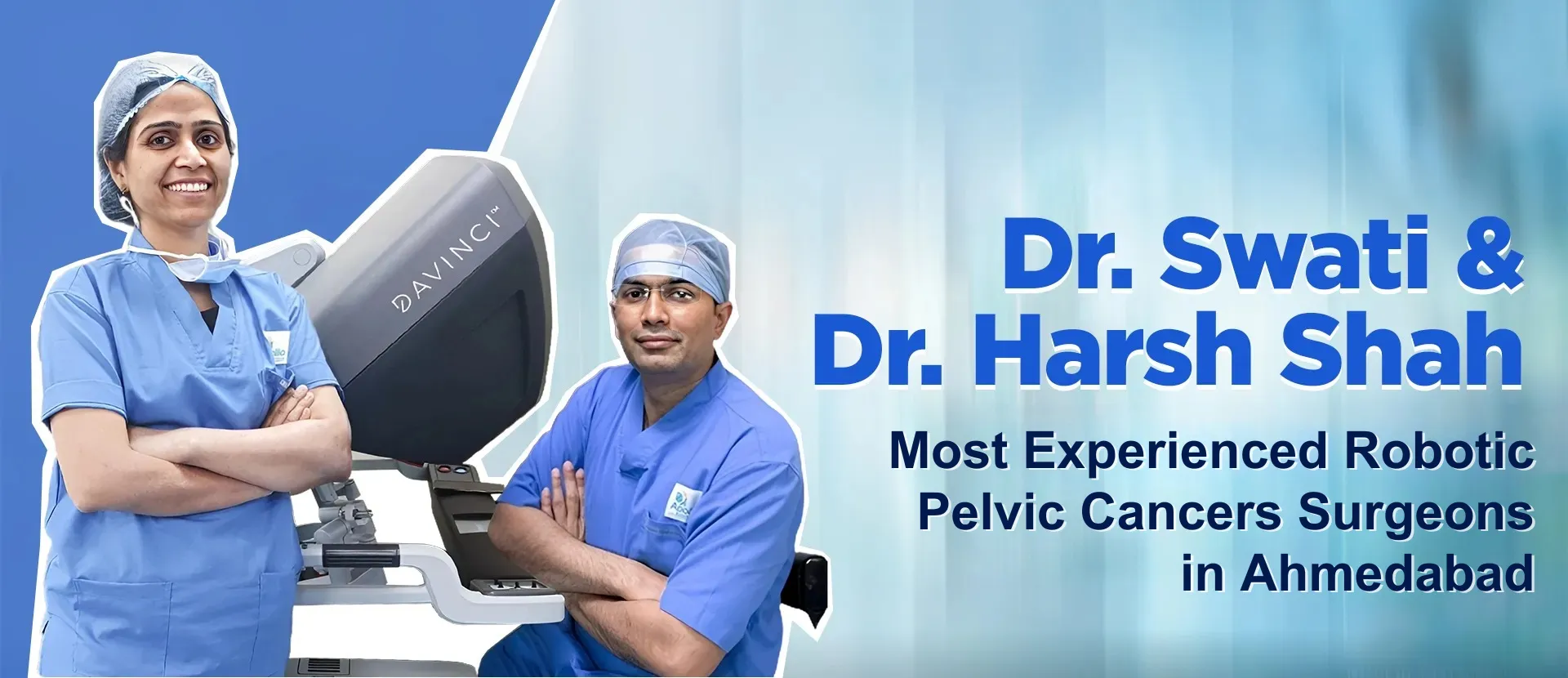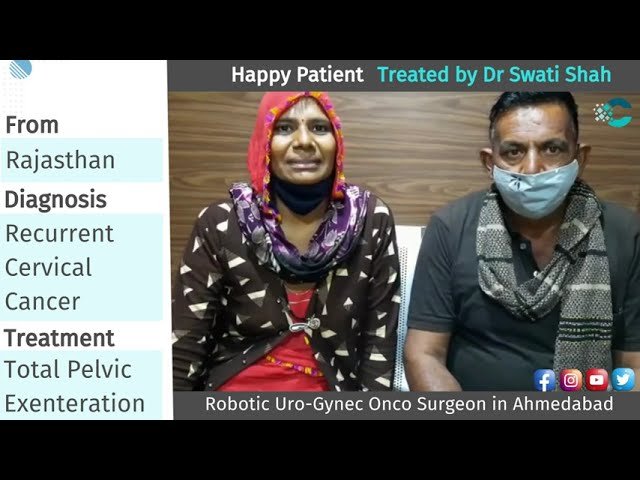Treatment for Recurrent & Advanced Pelvic Cancers in Ahmedabad

- Center of Excellence for Pelvic Cancers
- Management of all Pelvic Cancers
- 15+ Years of Surgical Expertise

Being diagnosed with recurrent or advanced pelvic cancer requires expert medical care. In Ahmedabad, Dr. Swati Shah is well-known for her expertise in treating recurrent and advanced pelvic cancers, providing the best robotic pelvic cancer surgery in Ahmedabad, Gujarat, and across India. With over 15+ years of experience in pelvic cancer surgery & 10+ years in Robotic Surgery, Dr. Shah's use of advanced medical technologies has helped many patients successfully face this difficult disease.
11750+ Patients
11750+ Patients have been successfully treated
15+ Years
15+ years of work experience
as a pelvic cancers specialist
24 + Awards
24+ Awards received by Dr. Shah for her achievements

Dr. Swati Shah
MS, DrNB (Surgical Oncology)
Meet
Dr. Swati Shah
MS, DrNB (Surgical Oncology)
- Leading Uro & Gynec Caner surgeon in India
- 15+ years of experience in treatment of Pelvic Sarcoma (bone/ soft tissue) & Pelvic Cancers (Advanced or recurrent cervix/ uterus/ ovary/ rectal cancers)
- Successfully treated such patients with Open/Laparoscopic/ Robotic surgery
- Expertise in Pelvic Tumour resection, Pelvic Exenteration, Hemipelvectomy, Pelvic vascular resection & reconstruction
⦿ MS (General Surgery) : Maulana Azad Medical College, New Delhi
⦿ DrNB Surgical Oncology : Rajiv Gandhi Cancer Institute, New Delhi.
⦿ Training in Gynec Cancer Surgery & HIPEC from the pioneer institute for Gynec Cancer surgeries in New Delhi.
⦿ Laparoscopic Hysterectomy for early-stage uterine cancer
⦿ Pelvic Exenteration for advanced pelvic cancers
⦿ Prostatectomy for prostate cancer
⦿ Cystectomy for bladder cancer
⦿ Cytoreductive Surgery for advanced ovarian or uterine cancer
⦿ Robotic-Assisted Surgery for pelvic cancers

Know about Pelvic Cancers
What is Pelvis?



What tumours occur in Pelvis?
- Bladder Cancer
- Prostate Cancer
- Ovarian Cancer
- Cervical Cancer
- Uterine Cancer
- Rectal Cancer


Total Pelvic Exentration

Ileal Conduit

Soft tissue tumors

Bone tumors
Pelvic bone tumour

Internal Hemipelvectomy

Internal Hemipelvectomy

Reconstruction

Success Stories
Video Testimonials
Happy Patients



Robotic Cancer Surgery in Ahmedabad


Surgical Videos & Photographs
Explore surgical videos & photographs with caution. Please be advised that viewer discretion is recommended.
Why Us?
Surgeons
Dr Swati Shah (Uro & Gynec Oncosurgeon) and Dr Harsh Shah (GI & HPB Oncosurgeon) have 15+ years of experience in performing Recurrent & Advanced Pelvic Cancer surgeries.
Image guided & biopsy based Case Planning
Each case is analysed and discussed in multidisciplinary team including radiologists, pathologists & oncologists. CT scan/ MRI/ PET scan and biopsy reports are studied in detail to plan the surgery.
Peri operative Management
Patient optimisation, fitness and care during surgery is managed by team of doctors. Expert Anaesthetists to manage such cases. Operation theatres are well equipped & OT staff & technicians are trained for such cases.
Post op Management
State of the art ICU & round the clock ICU team to make the post operative recovery smooth. Team of doctors including intensivists, physicians, cardiologists, chest physicians & physiotherapists is available.
Why Us?
Surgeons
Dr Swati Shah (Uro & Gynec Oncosurgeon) and Dr Harsh Shah (GI & HPB Oncosurgeon) have 15+ years of experience in performing Recurrent & Advanced Pelvic Cancer surgeries.
Image guided & biopsy based Case Planning
Each case is analysed and discussed in multidisciplinary team including radiologists, pathologists & oncologists. CT scan/ MRI/ PET scan and biopsy reports are studied in detail to plan the surgery.
Peri operative Management
Patient optimisation, fitness and care during surgery is managed by team of doctors. Expert Anaesthetists to manage such cases. Operation theatres are well equipped & OT staff & technicians are trained for such cases.
Post op Management
State of the art ICU & round the clock ICU team to make the post operative recovery smooth. Team of doctors including intensivists, physicians, cardiologists, chest physicians & physiotherapists is available.
Key Benefits of Minimally Invasive Surgery for Pelvic Cancers
- Smaller cuts reduce pain and scarring.
- Faster recovery and less downtime.
- Less blood loss during surgery.
- Lower infection risks due to smaller wounds.
- Quick return to normal activities.
- Precise removal of cancerous tissue.
- Shorter hospital stays post-surgery.
- Minimally invasive with less discomfort.
- Preserves more healthy tissue.
Which Pelvic Cancer Surgery is the Best Option for You or Your Loved Ones?
| Type of Surgery | Description | Advantages | Considerations |
|---|---|---|---|
| Open Surgery | Large incision to remove the tumor | Allows removal of large tumors, direct access to organs | Longer recovery time, more pain |
| Laparoscopic Surgery | Small incisions with camera assistance | Less invasive, faster recovery, smaller incisions | Limited in complex tumor removals |
| Minimally Invasive Surgery | Combines small incisions and precise tools | Reduced pain, quicker recovery, smaller scars | May not be suitable for all patients |
| Enhanced Visualization | Advanced imaging tools to guide surgery | Improved precision, better view of surgical area | Requires specialized surgical expertise |
| Flexible Instruments | Instruments designed for delicate movements | Enhanced precision and accuracy, less blood loss | Limited access for certain types of tumors |
| Robotic Surgery | Keyhole surgery with robotic assistance | Greater precision, less pain, quicker recovery | Requires specialized equipment and expertise |
Why Choose Dr. Swati Shah's Pelvic Cancer Surgery?
Go for Dr. Swati Shah for best skills in robotic cancer surgery, especially with the Da Vinci System, making surgeries accurate and quick to recover from. Her advanced Robotic Surgery Center is available in Ahmedabad, Gujarat.


Infrastructure
The Hospital also has 50+ bedded ICU with the latest support systems such as ventilators, dialysis machines & a team of best critical care doctors.
Radilogy department is fully equipped with latest CT Scan & MRI machines. The hospital also has an interventional radiology suit.
Contact Robotic Surgery Centre
We provide a 24*7 emergency care.
The Revolution of Robotic Surgery in The Treatment of Pelvic Cancers


Frequently Asked Questions
A hemipelvectomy involves removing part of the pelvis, often to treat bone cancers like sarcoma. It can be either internal, where the leg is preserved, or external, where the leg is amputated.
Life after a hemipelvectomy involves a long recovery period with rehabilitation. Many patients regain mobility with the help of prosthetics or assistive devices and can return to everyday activities.
Long-term effects include changes in mobility, bowel, and bladder function. Patients may require rehabilitation and stoma care to adjust to new ways of managing these bodily functions.
Risks include infection, bleeding, blood clots, and potential damage to surrounding organs. There is also a risk of serious complications, which should be thoroughly discussed with your healthcare team.
Recovery involves a hospital stay, followed by rehabilitation to regain strength and mobility. Patients will also receive training on stoma care, if needed, and may work with physical therapists for rehabilitation.
Yes, most patients can adapt to a new normal, managing stoma care or prosthetics. With rehabilitation and support, most people return to daily activities and lead fulfilling lives.
Support includes physical therapy, stoma care education, and emotional counseling. Many healthcare centers offer specialized rehabilitation programs and support groups to help patients adjust post-surgery.
A stoma is a surgically created opening on the surface of the abdomen, allowing bodily waste to pass out of the body.
⦿ Purpose: Allows bodily waste to exit when normal function is impaired.
⦿ Common reasons: Colorectal cancer, inflammatory bowel disease, bladder cancer.
⦿ Types: Colostomy (colon), ileostomy (small intestine), urostomy (urinary system).
⦿ Waste collection: A bag attached to the stoma collects waste.
⦿ Post-surgery care: Requires special care and management to prevent infections.
Life after bladder or rectum removal requires some adjustments, but with proper care, patients can live fulfilling lives.
⦿ After bladder removal, a urinary diversion or urostomy may be needed to help drain urine. For rectal removal, a colostomy or ileostomy is used for stool passage.
⦿ Patients must follow post-surgery care instructions, including maintaining stoma hygiene and dietary changes. Regular follow-ups with the healthcare team are crucial to monitor recovery and manage any complications.
Managing a stoma involves proper care to ensure comfort and prevent complications. Here are key steps:
⦿ Cleanliness: Gently clean the skin around the stoma with warm water and pat dry.
⦿ Stoma bag: Change the stoma bag regularly, ensuring it fits well to avoid leaks.
⦿ Skin protection: Use barrier creams or wipes to prevent skin irritation.
⦿ Diet: Eat a balanced diet to minimize gas and odor.
⦿ Monitor changes: Watch for redness, swelling, or infection around the stoma and consult your doctor if needed.
Yes, patients can walk after pelvic bone removal, but it depends on the extent of surgery and rehabilitation. Initially, walking may require assistance like crutches or walkers.
⦿ A specialized rehabilitation program, including physiotherapy, is crucial to regain mobility and strength.
⦿ Recovery time varies, but with consistent therapy, many patients achieve functional walking ability.
⦿ Regular follow-ups with the healthcare team are essential to monitor progress.
Get in touch
We provide a 24*7 emergency care.
If you have any kind of Uro, Gynec, GI & HPB Cancers related medial emergency, visit Apollo Hospital. An expert doctors is always available & treatment will be provided at once.








